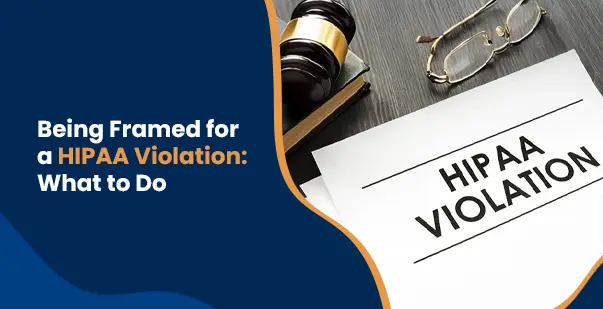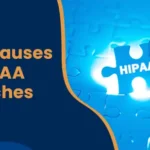Being Framed for a HIPAA Violation: What to Do?

August 9, 2025
Being accused of a HIPAA violation can be overwhelming for any healthcare professional. From 2009 to 2020, over 176 million patients in the U.S. were affected by data breaches. Surprisingly, many of these incidents weren’t caused by external cyberattacks but by internal mistakes, negligence, or HIPAA non-compliance. In some cases, employees are even falsely accused or framed, making it essential to understand how to respond effectively.
In a workplace, several accusations can arise from misunderstandings, personal conflicts, or even intentional malice. However, it is necessary to understand how to get through these challenging situations without affecting your reputation or employment.
You can take certain steps to address the situation effectively. This blog guides you on what to do if accused of HIPAA violation.
Understanding HIPAA
The HIPAA was enacted in 1996 to protect the privacy and security of individuals’ medical information. Today, HIPAA is more important than ever. However, some healthcare workers face false accusations of violating HIPAA rules.
The primary objectives of HIPAA and its requirements are as follows, which each individual and organization must adhere to:
Privacy Rule
This component regulates how healthcare clearinghouses, plans, and providers should handle personal health information (PHI). It dictates when PHI can be disclosed and requires explicit consent from patients in many cases.
Security Rule
This rule sets standards for safeguarding electronic PHI (ePHI) against unauthorized access, which ensures that appropriate administrative, physical, and technical safeguards are in place.
Breach Notification Rule
If unsecured PHI is breached, covered entities must notify affected individuals, the Department of Health and Human Services (HHS), and, in some cases, the media.
Enforcement
The Office for Civil Rights (OCR) within HHS is responsible for enforcing HIPAA. Violations can result in hefty fines, sanctions, or even criminal charges.
Given the strict nature of these regulations, accusations of violations can have serious repercussions for individuals and organizations alike.
Read More: Does HIPAA Prohibit Questions About Vaccination?
Recognizing the Signs of a False Accusation
Being aware of these indicators can help you get through the situation more effectively. Many people may not recognize the subtle signs that suggest malicious intent. Let us look at some signs that suggest you might be a victim of wrongful accusations:
Anonymous Complaints
Receiving a complaint from an unknown source about mishandling patient data can be alarming. It’s important to document your actions and maintain compliance with HIPAA rules. Investigate the claim thoroughly to determine its validity. If false, consider escalating the issue to ensure your reputation is protected.
Discrepancies in Documentation
If your records are altered or appear inconsistent, it could indicate foul play. Regularly reviewing and securing your documentation can help prevent unauthorized changes. Always maintain a clear audit trail to demonstrate transparency.
Witness Testimonies
Conflicting statements from colleagues or patients can damage your credibility. In such cases, gather evidence to support your side of the story. Encourage impartial investigations to uncover the truth. Maintaining professionalism and clear communication can also help counteract false claims.
Prior Conflicts
Past disagreements with coworkers or management can sometimes escalate into false accusations. Address conflicts constructively and document all interactions. Building strong, professional relationships reduces the chances of misunderstandings. If targeted, seek legal or HR assistance to resolve the matter fairly.
Steps to Take if You Are Framed
Knowing how to respond when faced with a false accusation is necessary. There are specific actions you can take to protect yourself. Hence, you should remain composed and thoughtful in your approach. A structured response can help you regain control over the situation.
Thus, if you suspect you have been wrongfully accused of a HIPAA violation, consider the following steps to protect your rights:
-
Stay Calm and Assess the Situation
Receiving accusations can be stressful. The first step is to remain calm and assess the situation objectively. Avoid acting impulsively, as your response can significantly impact the outcome. Take a moment to gather your thoughts and approach the issue rationally.
-
Document Everything
Accurate documentation is critical. Maintain a record of all interactions related to the accusation, including:
- Dates and Times: Note when incidents occurred, as this can help establish a timeline.
- Communication Records: Save emails, messages, or any form of communication related to the accusation.
- Witness Statements: If colleagues can vouch for your conduct, gather written statements from them.
-
Consult Your Employee Handbook
Your employer’s guidelines and policies about HIPAA infringements should be summarized in your worker handbook. Familiarize yourself with these guidelines to understand the protocol for addressing accusations. This might also assist you in discovering any rights breaches by your supervisor throughout the inquiry.
-
Reach Out to Your Supervisor or HR
Consider discussing the situation with your supervisor or human resources (HR) department. Approach them professionally, presenting your case and any evidence you have collected. Express your concerns about getting framed and seek guidance on the next steps.
-
Engage a Legal Professional
If the situation escalates, consult a legal expert skilled in healthcare law or HIPAA. They can explain your rights and alternatives. An attorney can also advise on how to approach inquiries or inspections. This guarantees your rights are safeguarded during the whole procedure.
-
Prepare for an Investigation
If an investigation is initiated, be prepared to cooperate fully. Gather all relevant documentation and be ready to answer questions. However, avoid volunteering unnecessary information, as it may inadvertently implicate you. Stick to the facts and maintain a professional demeanor throughout the investigation.
-
Respond to Allegations Formally
If you receive a formal notice about the allegations, respond promptly. Your statement should declare unequivocally that you refute the charges and give corroborating proof. You should also provide any evidence supporting your argument. This contains testimony from witnesses and pertinent communications. If required, get clarity on the precise claims. This will allow you to handle the appropriate concerns.
-
Follow Up
After responding to the allegations, follow up with your supervisor or HR to check on the investigation’s progress. Maintain open communication, showing collaboration while supporting your rights.
Potential Consequences of a HIPAA Violation
The implications of a HIPAA violation are serious and multifaceted. Understanding the potential outcomes can help you appreciate the gravity of the situation. Each case may carry different repercussions that can affect your career and personal life.
Understanding the outcomes of a HIPAA breach highlights its seriousness. Fines for Penalties for offenses vary based on the rigor and nature of the infraction.
Civil Penalties
Civil fines for HIPAA violations start at $100 per offense. However, they can escalate to $250,000 if the violation is due to intentional neglect and remains uncorrected for over 30 days. Medical facilities must respond quickly to such situations in order to avoid hefty financial fines. Regulatory checks and instructions can help reduce hazards.
Criminal Penalties
Willful neglect or deliberate misconduct can lead to criminal charges. Offenders may face penalties of up to $250,000 and incarceration for up to ten years. These sanctions emphasize the need to preserve patient data. To prevent legal penalties, rigorous adherence to HIPAA regulations is required.
Reputational Damage
Being accused of a HIPAA violation can severely harm your professional reputation. It may lead to a loss of trust among colleagues and patients. Additionally, it can impact future job prospects, making it vital to handle accusations with transparency and integrity.
Job Termination
Following an investigation, you might face disciplinary action or even job termination. Employers often take strict measures to ensure compliance with HIPAA regulations. Ensuring meticulous handling of patient data and addressing any lapses can help safeguard your career.
Understanding the Investigation Process
The investigation process following an accusation can be complex. Therefore, you should familiarize yourself with the typical steps that can ease some of the uncertainty. A common concern for those accused is understanding how long a HIPAA violation investigation takes. While timelines vary, investigations can span from a few weeks to several months, depending on the case’s complexity and the entities involved.
. This process can vary by organization, but it typically involves the following steps:
- Initial Review: A compliance official will perform an initial review of the allegations. This will help determine if they warrant further investigation.
- Gathering Evidence: The investigator will collect all important documentation, interview all parties involved, and review any available evidence.
- Findings: Once the investigation ends, the investigator will assemble a report detailing the findings, which will state whether the allegations were verified.
- Notification: You will be informed of the findings and any resulting actions. This may include disciplinary measures or more training.
- Appeal Process: If you disagree with the findings, you may have the right to appeal the decision. You can do so through your employer’s designated channels.
Preventing Future Issues
Taking preventive measures significantly reduces future risks. A method that will aid in crafting a much more secure setting for every person. Comprehending how to use all the best approaches is essential, especially for long-lasting success. You can implement the following measures:
- Training and Education: Participate in HIPAA training sessions. This will help you stay informed about privacy regulations and best practices. Encourage your colleagues to do the same.
- Promote Open Communication: You should create a comfortable environment for all the workers. This will help them discuss more concerns related to HIPAA adherence. Open dialogue can help prevent misunderstandings and false accusations.
- Review Policies and Procedures: Familiarize yourself with your employer’s HIPAA policies and procedures. Ensure that you and your team adhere to these guidelines at all times.
- Use Secure Systems: Always use secure systems for handling PHI. This includes encrypted communication methods and secure storage solutions.
- Maintain Professional Relationships: Maintain good relationships with all your colleagues. This will not lessen the chances of conflicts, which could lead to false accusations.
Read More: What is the HIPAA Privacy Rule?
Protecting Yourself Against HIPAA Accusations
Being accused of a HIPAA violation is stressful and can impact your career. However, once you know what to do if accused of HIPAA violation, you can effectively protect yourself or your organization from being framed for the violation. The key is to stay calm, keep detailed records, and consult your employee handbook. If needed, don’t hesitate to seek legal advice.
Taking steps to prevent future issues, maintaining open communication, and following HIPAA guidelines can help you protect yourself and your workplace.





